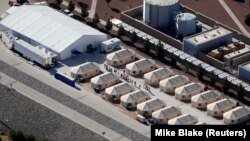The Navy is prepared to construct massive detention centers on military bases for tens of thousands of immigrants caught illegally crossing the southern U.S. border, should the Department of Homeland Security request help, a U.S. official told VOA.
The official confirmed the Navy drafted a memo for Navy Secretary Richard Spencer highlighting bases in remote areas of California, Arizona and Alabama as potential locations for tent cities for adult detainees.
The draft proposal states the Navy could potentially hold as many as 47,000 migrants at each of the two California bases, one near San Francisco and another in southern California. It also suggests that 25,000 migrants could be held at a base near Mobile, Alabama, and an undetermined number of migrants could stay at a tent city built at the Marine Corps Air Station near Yuma, Arizona.
Time magazine was the first to obtain and report on the draft memo.
Pentagon spokesman Lieutenant Colonel Jamie Davis told VOA the Defense Department was looking nationwide as part of "prudent planning" should the Department of Homeland Security ask for assistance in "housing adult illegal immigrants."
"At this time, there has been no request from DHS for DoD support to house illegal migrants," he added.
When asked about the memo Friday, Chief Navy spokesman Captain Greg Hicks said, "it would be inappropriate to discuss internal deliberative planning documents."
The Navy plans documented in the draft memo are separate from Pentagon preparations currently under way to house unaccompanied minors detained who illegally crossed the U.S. southern border.
On Thursday, the Pentagon said it had accepted a request from the Department of Health and Human Services to house as many as 20,000 unaccompanied migrant children.
The Department of Health and Human Services handles juvenile issues, while the Department of Homeland Security handles adult detentions along the border.
The government has looked at three bases in Texas and one in Arkansas as possible housing locations. Pentagon spokesman Davis stressed, however, that the base visits did not guarantee that any or all of the children would be placed in those locations.




